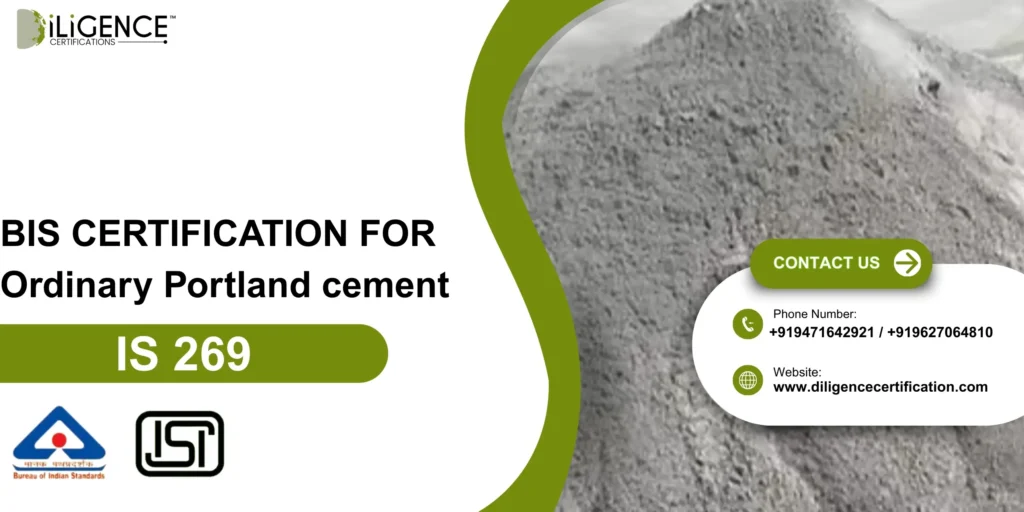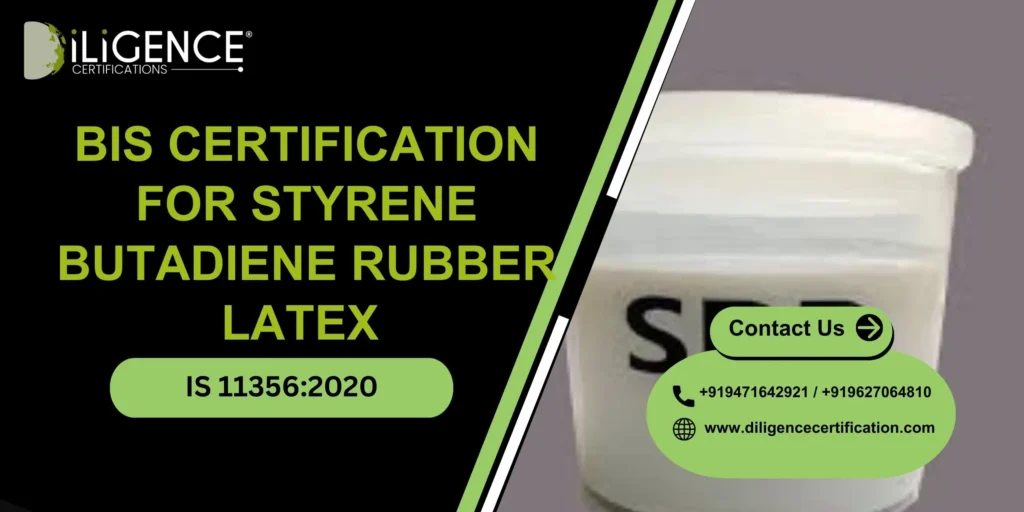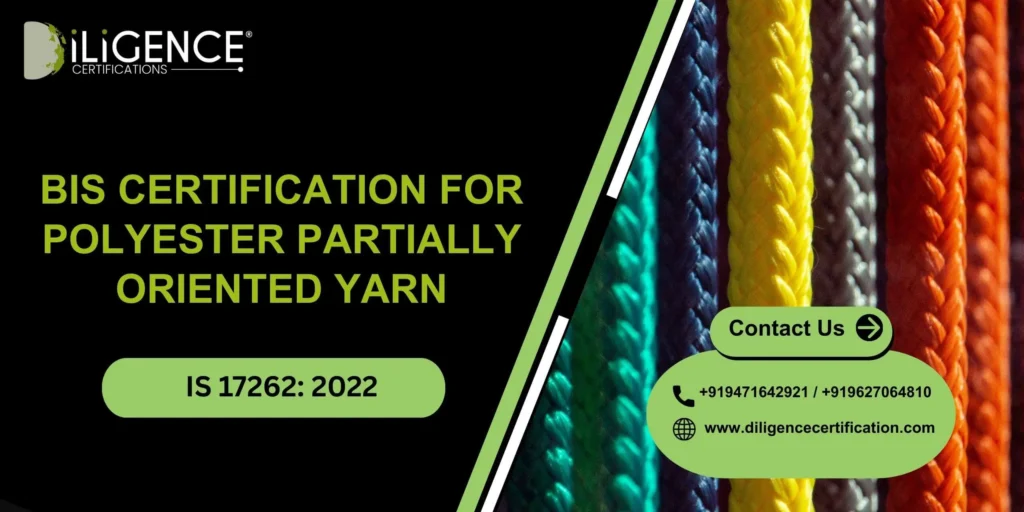- IS 269 defines 33 Grade OPC, the most basic form of cement in India, designed to achieve 33 MPa strength at 28 days while meeting BIS safety and quality norms.
- BIS certification is mandatory—without the ISI mark under IS 269, cement cannot be legally sold or used in government or large private projects.
- Ideal uses include plastering, brick masonry, flooring, and small RCC works, where early high strength isn’t required and cost-saving is a priority.
- Each cement bag must carry proper markings like ISI logo, grade, batch number, and manufacturer details; otherwise, it’s rejected on-site.
- Even today, IS 269 OPC has a strong market, especially in rural and low-cost housing, despite the growth of 43/53 Grade OPC and blended cements.
Introduction
Cement is one of the major building materials in construction, and in India Ordinary Portland cement is primarily used in all forms of building works. The grade defined under IS 269 OPC 33 is the simplest and widely regarded essential type. It is especially suitable for plastering, masonry, flooring and as low rise RCC structures.
As per BIS standards IS 269, ensures that cement attains at least 33 MPa in 28-days in addition to strict monitoring and evaluation of the setting time, fineness and durability of the cement. Each bag of cement must carry the ISI mark. Without it, it cannot be used in government and major construction projects.
As it remains relatively cheap and consistently good in quality IS 269 OPC 33 Grade remains a go to option in small to moderate projects. Builders, contractors and, homeowners nationwide still often use this product.
What is BIS Certification for Ordinary Portland Cement (OPC)?
BIS Certificate is a Certificate of Conformance issued to Ordinary Portland Cement by Bureau of Indian Standards (BIS). This indicates that the cement has been tested for strength, quality, and safety according to Indian Standards – IS 269 (33 Grade), IS 8112 (43 Grade) and IS 12269 (53 Grade).
The moment a cement manufacturer obtains BIS certification, he/she can print the ISI mark on the bag of cement. The ISI mark proves that the cement is safe to use. OPC cannot be sold legally for government work or for major building contracts if it does not have BIS certification.
Simply put, BIS certification is a quality assurance that makes sure the cement you purchase is safely years of use.
Why is BIS Certification Compulsory for Ordinary Portland Cement?
BIS Certification is compulsory for OPC because cement is the backbone of a construction project. If cement quality could not be consistently checked, then it would be completely valid to say that a structure such as a building, bridge, or road is structurally inadequate and unsafe. BIS will ensure that OPC conforms to specific rules for ‘strength,’ ‘safety,’ and ‘durability.’ This is very important to know as only BIS-accredited cement can be supplied for sale. This is totally justified in ensuring safety to people and buildings.

IS Standards Under BIS for Cement:
| IS Code | Cement Type / Specification |
| IS 12330 | Sulphate Resisting Portland Cement |
| IS 12600 | Low Heat Portland Cement |
| IS 1489 (Part 1) | Portland Pozzolana Cement – Part 1 (Fly-ash based) |
| IS 1489 (Part 2) | Portland Pozzolana Cement – Part 2 (Calcined clay based) |
| IS 269 | Ordinary Portland Cement |
| IS 3466 | Masonry Cement |
| IS 455 | Portland Slag Cement |
| IS 6452 | High Alumina Cement for Structural Use |
| IS 6909 | Super Sulphated Cement |
| IS 8041 | Rapid Hardening Portland Cement |
| IS 8042 | White Portland Cement |
| IS 8043 | Hydrophobic Portland Cement |
| IS 8229 | Oil Well Cement |
| IS 16415:2015 | Composite Cement – Specification |
| IS 16993:2018 | Microfine Ordinary Portland Cement – Specification |
| IS 15895:2018 | High Alumina Refractory Cement |
Importance and Benefits of BIS Certification
BIS (Bureau of Indian Standards) Certification is very important because it ensures that products are safe, sound and of quality. It is like a guarantee for customers and a license for manufacturers.
Importance:
- It is mandatory for many products like cement, steel, electrical goods, etc., to protect people’s safety.
- It helps to build confidence between consumers and organizations.
- Without BIS certification products cannot be sold legally in India in many product categories.
Benefits:
- Customers get safe and reliable products.
- Companies can easily enter government projects and big markets.
- It gives brand value and customer trust.
- It helps in reducing complaints and increasing customer satisfaction.
BIS Certification Process for Ordinary Portland Cement (OPC): Step-by-Step
Indian Manufacturers (ISI Mark Scheme):
- Identify IS Code & Cement Type – For OPC, submit application under IS 269:2015 (33, 43, 53 grades).
- BIS Officer inspection – A BIS officer visits your plant where they check a sample of the manufacturing process and laboratory set up.
- Testing (In-House + BIS Lab) – Cement samples have to be tested both in your laboratory and the identified BIS-recognized, third-party laboratory.
- Reports and Documents – You provide a copy of test results, testing records and compliance documents.
- Submit Reports & Documents – Provide test results, quality control records, and compliance documents.
- Grant of License – After approval, BIS issues an ISI license. You can now use the ISI mark on OPC bags.
For Foreign Manufacturers (FMCS Scheme)
- Appoint Indian Representative (AIR) – Must have an official representative in India.
- Apply with Factory Details – Submit online application with factory and product info.
- Pay Application & Audit Fees – Pay charges for audit, testing, and certification.
- BIS Foreign Audit – BIS team visits the foreign plant to verify production and quality.
- Sample Testing in India – Cement samples are sent to Indian BIS labs for testing.
- BIS Review – BIS checks reports, documents, and compliance with IS 269.
- Certification Granted – Once approved, you can use the BIS mark for selling OPC in India.

Documents Required for BIS Certification of OPC Cement
- Application Form – Filled on the BIS Manakonline Portal.
- Company Registration Proof – Certificate of Incorporation / GST / MSME (as applicable).
- Manufacturing Unit Documents – Factory license, location details, and plant layout.
- Process Flow Chart – Step-by-step cement production process.
- In-House Lab Setup Details – List of testing equipment and calibration certificates.
- Quality Control Documents – Internal quality checks and SOPs followed in the factory.
- Raw Material & Finished Product Details – Source, composition, and safety compliance.
- Test Reports – In-house + third-party cement testing reports as per IS code.
- Authorized Signatory Documents – ID proof and authorization letter for BIS communication.
- Marking Fee & Application Fee Payment Proof – As per BIS schedule.
Validity & Renewal of BIS License
- Initial license validity: 1 to 2 years
- Renewal Period: Up to 5 years with proof of continued IS compliance
- Surveillance Audits: Done at least once a year
Renewal requires:
- Updated documentation
- Payment of renewal fees
- Past surveillance audit outcomes
Common Challenges in BIS Cement Certification
Despite its benefits, manufacturers often face these roadblocks:
- Testing Delays from overloaded labs
- Non-Conformity During Audit
- Improper Documentation
- Infrastructure Gaps in Lab Setup
- Lack of Regulatory Understanding
Partnering with experienced consultants like Diligence Certifications can cut approval time by 40%.
Why Choose Diligence Certification?
For compliance and credibility, Diligence Certification is much more than a simple checklist — it provides true confidence in your business.
Diligence Certification encompasses all facets of making sure your business is ethical, responsible, and aligned with laws and industry best practices. It examines your company’s legal, financial and operational status — meaning that you are not just certified, but trusted.
Here’s why businesses rely on Diligence Certification:
- Stronger Risk Protection
It helps you spot hidden legal, financial, or operational risks early — so you can fix problems before they become threats. - Earn Stakeholder Trust
From investors to customers, people want to work with businesses that play by the rules. Diligence Certification proves you’re one of them. - Stay Legally Aligned
It makes sure your company is complying with laws not just regarding your products, but also labor laws, environmental laws, tax laws, and more. - Enhance Your Brand Reputation
Consumers respect ethical, transparent businesses. Diligence Certification shows the world that you operate with integrity.
- Stand Out from Competitors
In a crowded market, credibility is your biggest edge. Certification helps position your brand as reliable and responsible — not just another name.
Conclusion
BIS Certification ensures that your Ordinary Portland Cement (OPC) is reliable for use and safe for the public, and meets the Indian Standards set for quality. It protects your customers, creates trust, and gives the manufacturer the opportunity to legally sell the cement in India, and also to complete government projects.
With the right guidance from experts like Diligence Certifications, the entire process – from application to getting the ISI mark – becomes simple and hassle-free. Investing in BIS-certified OPC Cement is not just compliance; it is a mark of quality, safety, and credibility in the construction industry.
Frequently Asked Questions
Which IS standard applies to OPC Cement?
OPC Cement should confirm to IS 269:2015 (33 Grade), IS 8112:2013 (43 Grade), or IS 12269:2013 (53 Grade).
Is BIS certification mandatory for OPC Cement in India?
Yes. As per the BIS Compulsory Registration Scheme, OPC cannot be manufactured or sold in India without ISI mark.
Can imported OPC Cement be sold in India without BIS license?
No. Foreign manufacturers must obtain BIS license under the FMCS (Foreign Manufacturers Certification Scheme) before export.
How long does it take to get BIS certification for OPC?
Normally 4–6 weeks for Indian manufacturers and 6–8 weeks for foreign manufacturers.
What is the validity of BIS license for OPC Cement?
Initially, it is granted for 2 years; it can be renewed for a maximum of 5 years.
Who grants BIS certification of cement?
BIS (Bureau of Indian Standards), Government of India.
What is the cost of BIS certification for OPC Cement?
Cost includes application fee, audit charges, test charges, and marking fee, depending on production capacity.
What happens if a company sells OPC without BIS license?
Heavy penalties, cancellation of business license, and product seizure.
Is factory inspection mandatory for BIS OPC license?
Yes. BIS officials physically verify plant, testing lab, and quality system before granting license.
Can one BIS license cover multiple grades of OPC Cement?
No. Each grade (33, 43, 53) requires a separate license in its respective IS code.



 BIS Certification
BIS Certification
 CDSCO
CDSCO
 CPCB
CPCB
 LMPC
LMPC
 WPC Approval
WPC Approval
 Global Approvals
Global Approvals
 TEC
TEC
 ARAI
ARAI
 BEE
BEE
 ISO Certification
ISO Certification
 Drone Registration
Drone Registration
 NOC For Steel
NOC For Steel



















 Business Registration
Business Registration














 Legal Services
Legal Services
 Trademark Registration
Trademark Registration
 Copyright Registration
Copyright Registration
 Patent Registration
Patent Registration

















































